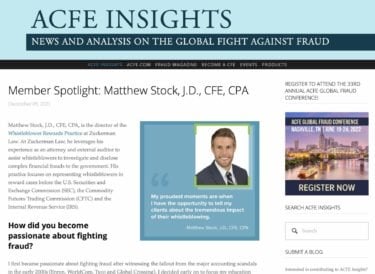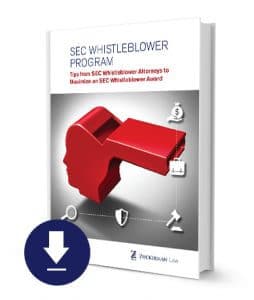Issues to Consider Before Filing an SEC Whistleblower Complaint
Every client’s potential matter is unique and requires analysis of the specific violation that the whistleblower has uncovered. When we assess potential Dodd-Frank whistleblower rewards claims, we typically focus on these issues before filing an SEC whistleblower complaint:
- What type of securities law violation are you seeking to report? Some examples include:
- Accounting fraud;
- Fraudulent investment scheme, such as a Ponzi scheme or EB-5 investment fraud;
- Material misstatement or omission in a company’s public filings or financial statements;
- Insider trading;
- Manipulation of a security; and
- Bribery of, or improper payments to, foreign officials (FCPA violations)
- What is a brief description of the violation?
- What type of entity does the violation relate to, e.g., a publicly-traded company in the US?
- Do you believe the violation is material, e.g., would the violation require a publicly-traded company to restate previously issued financial statements?
- Is the violation ongoing?
- Do you have evidence of the violation? If so, please describe the evidence and how you obtained it.
- Are you aware of any evidence (not in your possession) that would demonstrate the violation? In particular, is there evidence showing that senior company officials are aware of the violation or have admitted to the violation?
- When and how did you first learn of the violation?
- Have you raised concerns about the violation to your supervisor, compliance office, whistleblower hotline, etc.? If so, who did you report to and when did you take this action?
- Have you suffered any retaliation for raising concerns about the violation?
- Have you had any prior communications with the SEC (or any other agency or organization) concerning this matter?
- Do you want to report anonymously to the SEC through an attorney?
In responding to these questions, you should not share any privileged information, i.e., information you received from an in-house or outside counsel.
Since 2012, the SEC has issued nearly $1 billion in awards to whistleblowers, which includes awards to our clients totaling millions of dollars. The top SEC whistleblower attorneys can provide critical guidance to whistleblowers throughout this process to protect their identities and increase the likelihood that they not only obtain, but maximize, their awards.

In conjunction with our courageous clients, our SEC whistleblower lawyers have helped the SEC halt multi-million dollar investment schemes, expose violations at large publicly traded companies, and return funds to defrauded investors.
Recently the Association of Certified Fraud Examiners published a profile of SEC whistleblower lawyer Matt Stock’s success working with whistleblowers to fight fraud:
SEC Whistleblower Resources
Below are links to resources on our website about the SEC whistleblower program and protections for SEC whistleblowers. If you have questions about your SEC whistleblower claim, contact the SEC whistleblower attorneys at Zuckerman Law for a free, confidential consultation about your case by calling 202-262-8959.
Click below to hear SEC whistleblower lawyer Matt Stock’s tips for SEC whistleblowers:
Guide to the SEC Whistleblower Program
To learn more about the SEC Whistleblower Program, download Zuckerman Law’s eBook: Tips from SEC Whistleblower Attorneys to Maximize an SEC Whistleblower Award:
Video Resources
Why hire an SEC whistleblower lawyer?
How can a whistleblower get an award from the SEC whistleblower program?
FAQs About SEC Whistleblower Reward Program
- What is the SEC Whistleblower Program?
- What are the largest SEC whistleblower awards?
- What violations qualify for an SEC whistleblower award?
- Can Zuckerman Law represent me if I do not live in the state/country where the law firm has an office?
- Why should I choose the Zuckerman Law to represent me in my SEC whistleblower claim?
- Can I submit an anonymous tip to the SEC Whistleblower Office?
- When is the best time to report the fraud or misconduct to the SEC?
- Can I submit an SEC Whistleblower claim if the SEC already has an open investigation into the matter?
- Who is an “eligible” SEC whistleblower?
- Can compliance personnel, auditors, officers or directors qualify for an SEC whistleblower award?
- What is “original information”?
- How might my information “lead to” a successful SEC enforcement action?
- Can I submit a claim if I was involved in the fraud or misconduct?
- Do I have to report a securities law violations to my company before reporting the violation to the SEC?
- Can I submit a tip if I agreed to a confidentiality provision in an employment/severance agreement?
- What factors does the SEC consider when determining the amount of the award?
- What employment protections are available for SEC whistleblowers?
- What type of evidence should I submit to the SEC?
- What happens after I submit a tip to the SEC?
- How long does it take to receive an award?
Protections Against Retaliation for SEC Whistleblowers
SEC Whistleblower Protections: Dodd-Frank and Sarbanes-Oxley Prohibitions Against Retaliation
Sarbanes-Oxley Whistleblower Protection: Robust Protection for Corporate Whistleblowers
SEC Whistleblower Lawyers
See our 5 Tips for SEC Whistleblowers and Lessons Learned from SEC Whistleblower Awards.












